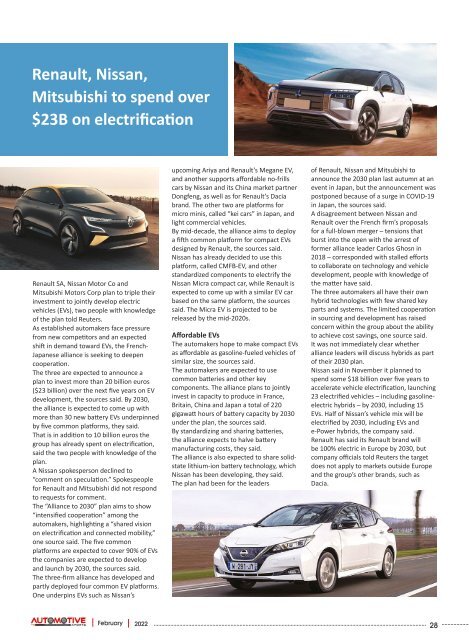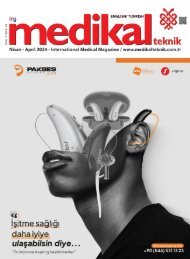Automotive Exports February 2022
Automotive Exports February 2022
Automotive Exports February 2022
Create successful ePaper yourself
Turn your PDF publications into a flip-book with our unique Google optimized e-Paper software.
Renault, Nissan,<br />
Mitsubishi to spend over<br />
$23B on electrification<br />
Renault SA, Nissan Motor Co and<br />
Mitsubishi Motors Corp plan to triple their<br />
investment to jointly develop electric<br />
vehicles (EVs), two people with knowledge<br />
of the plan told Reuters.<br />
As established automakers face pressure<br />
from new competitors and an expected<br />
shift in demand toward EVs, the French-<br />
Japanese alliance is seeking to deepen<br />
cooperation.<br />
The three are expected to announce a<br />
plan to invest more than 20 billion euros<br />
($23 billion) over the next five years on EV<br />
development, the sources said. By 2030,<br />
the alliance is expected to come up with<br />
more than 30 new battery EVs underpinned<br />
by five common platforms, they said.<br />
That is in addition to 10 billion euros the<br />
group has already spent on electrification,<br />
said the two people with knowledge of the<br />
plan.<br />
A Nissan spokesperson declined to<br />
“comment on speculation.” Spokespeople<br />
for Renault and Mitsubishi did not respond<br />
to requests for comment.<br />
The “Alliance to 2030” plan aims to show<br />
“intensified cooperation” among the<br />
automakers, highlighting a “shared vision<br />
on electrification and connected mobility,”<br />
one source said. The five common<br />
platforms are expected to cover 90% of EVs<br />
the companies are expected to develop<br />
and launch by 2030, the sources said.<br />
The three-firm alliance has developed and<br />
partly deployed four common EV platforms.<br />
One underpins EVs such as Nissan’s<br />
upcoming Ariya and Renault’s Megane EV,<br />
and another supports affordable no-frills<br />
cars by Nissan and its China market partner<br />
Dongfeng, as well as for Renault’s Dacia<br />
brand. The other two are platforms for<br />
micro minis, called “kei cars” in Japan, and<br />
light commercial vehicles.<br />
By mid-decade, the alliance aims to deploy<br />
a fifth common platform for compact EVs<br />
designed by Renault, the sources said.<br />
Nissan has already decided to use this<br />
platform, called CMFB-EV, and other<br />
standardized components to electrify the<br />
Nissan Micra compact car, while Renault is<br />
expected to come up with a similar EV car<br />
based on the same platform, the sources<br />
said. The Micra EV is projected to be<br />
released by the mid-2020s.<br />
Affordable EVs<br />
The automakers hope to make compact EVs<br />
as affordable as gasoline-fueled vehicles of<br />
similar size, the sources said.<br />
The automakers are expected to use<br />
common batteries and other key<br />
components. The alliance plans to jointly<br />
invest in capacity to produce in France,<br />
Britain, China and Japan a total of 220<br />
gigawatt hours of battery capacity by 2030<br />
under the plan, the sources said.<br />
By standardizing and sharing batteries,<br />
the alliance expects to halve battery<br />
manufacturing costs, they said.<br />
The alliance is also expected to share solidstate<br />
lithium-ion battery technology, which<br />
Nissan has been developing, they said.<br />
The plan had been for the leaders<br />
of Renault, Nissan and Mitsubishi to<br />
announce the 2030 plan last autumn at an<br />
event in Japan, but the announcement was<br />
postponed because of a surge in COVID-19<br />
in Japan, the sources said.<br />
A disagreement between Nissan and<br />
Renault over the French firm’s proposals<br />
for a full-blown merger – tensions that<br />
burst into the open with the arrest of<br />
former alliance leader Carlos Ghosn in<br />
2018 – corresponded with stalled efforts<br />
to collaborate on technology and vehicle<br />
development, people with knowledge of<br />
the matter have said.<br />
The three automakers all have their own<br />
hybrid technologies with few shared key<br />
parts and systems. The limited cooperation<br />
in sourcing and development has raised<br />
concern within the group about the ability<br />
to achieve cost savings, one source said.<br />
It was not immediately clear whether<br />
alliance leaders will discuss hybrids as part<br />
of their 2030 plan.<br />
Nissan said in November it planned to<br />
spend some $18 billion over five years to<br />
accelerate vehicle electrification, launching<br />
23 electrified vehicles – including gasolineelectric<br />
hybrids – by 2030, including 15<br />
EVs. Half of Nissan’s vehicle mix will be<br />
electrified by 2030, including EVs and<br />
e-Power hybrids, the company said.<br />
Renault has said its Renault brand will<br />
be 100% electric in Europe by 2030, but<br />
company officials told Reuters the target<br />
does not apply to markets outside Europe<br />
and the group’s other brands, such as<br />
Dacia.<br />
<strong>February</strong> <strong>2022</strong> 28

















